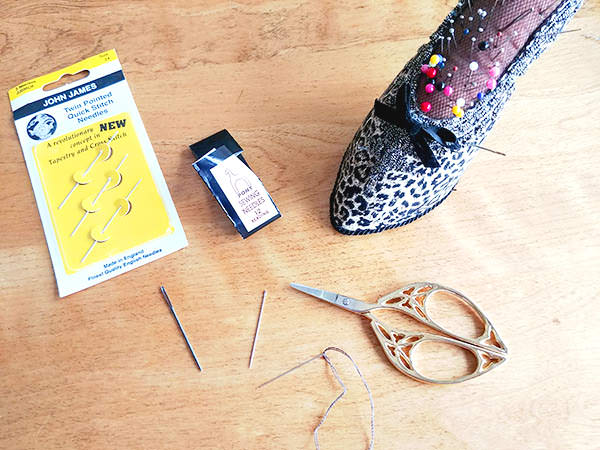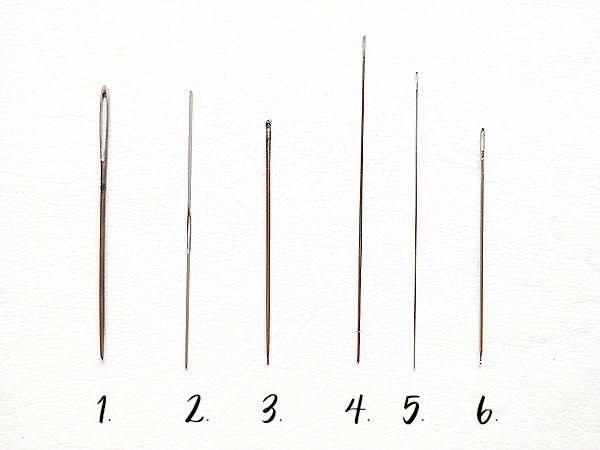Sometimes it can be confusing when shopping for cross stitch needles, to know which brands to get and which sizes or types. Tapestry needles are the most commonly used in cross stitch, but there are other specialty needles available as well. They might help turn your project into a beautiful work of art, and they might make your stitchy time that much more enjoyable.
Disclosure: Please note that some of the links in this post are affiliate links and if you go through them to make a purchase I will earn a commission (such as from Amazon). Keep in mind that I link these companies and their products because of their quality, and not because of the commission I receive from your purchases. I would never recommend something I wouldn’t use myself. 🙂
Types of cross stitch needles
-
- blunt tip to not puncture fabric
- wider eye (not good for French knots)
- size 24 to 26 is average for 14 count fabric, but you can experiment and see what works best for you

-
- great for stitching on a frame as you don’t have to turn your needle and thus twist your floss
- be careful as the eye is in the centre of the needle, they are more fragile

-
- straight shaft, the eye is the same width as the needle
- great for French knots

-
- also called wide eye needles
- great for beading, the one shown is 2.125″ (can go up to 5″ in length)
- be careful as they are more delicate
- depending on the ends, they may or may not be as sharp as a normal needle

-
- very fine, perfect for stitching seed beads
- can be difficult to thread (use beading thread)

-
- shaped like a regular sewing needle, but has a small ball on the end (that acts like the tip of a tapestry needle)
- 3.6 mm needles work for any size Aida, linen, evenweave, etc.
- 4.0 mm needles work for larger count Aida (6, 8, 10), perforated paper, waste canvas, and metallic threads
- made from German steel so they won’t go black
- the shaft is thinner than tapestry needles so there’s less friction
- In the video, I say these needles are available through an Etsy shop. That shop owner is now working with Sullivan’s, and the needles are now available through them.

Other tips:
- Use a slightly bigger needle for stitching metallic threads, it helps with friction from the thread passing through the eye fraying the metallic. It also pushes the fabric slightly farther apart, reducing friction of the thread passing through the fabric.
Links mentioned in the video:
John James Twin Pointed Needles
Clover Gold Eye Milliner’s Needles
DMC Beading Needles Assortment
Want to see more recommendations of stitching materials and tools, as well as stitchy books? Head to the Peacock & Fig Amazon page! 😀


12 Responses
cherney
I like a size 9 needle the eye isn’t to big and it goes through my even weave without hurting the fabric or the weave.
Dana Batho
Whatever works for you is what’s best. 😊 But a size 9 is an embroidery needle, not a tapestry needle, so for cross stitch that’s actually making your job harder as the sharp point can so easily catch the fabric (rather than going cleanly between the threads of the fabric). But if it works for you, keep going with it. 😊
Colleen
Thank you for the needle tutorial. I have ordered the twin tip needle and easy guide needle to try out. New to cross stitching, so this was very helpful.
Dana Batho
Awesome, I’m glad you found some fun new tools to play with Colleen! I use the Easy Guide needles almost exclusively now, they’re great. 🙂
Cheryl Hill
I thought the milliners needlers are also good for backstitching??? Is that true????
Dana Batho
Yep they absolutely can be, but their eye in proportion to the shaft is quite small (as milliners needles are designed to punch through thick felt or other hatmaking materials), so you may find a finer embroidery needle works better. 😊
Jayee
I inherited beautiful needles from my mother, but they were not all packaged, so is there a mark to identify the size of a needle no longer in its package?
Dana Batho
Hi Jayee! Maybe, I’m sure there are charts online you could print and compare to your needles, but I don’t know of any offhand unfortunately. 🙂
Leona Martin
Is Etsy the only place one can purchase the Easy Guide Needle?
Dana Batho
Hi Leona! Mila has just started selling them through Charting Creations as well (www.chartingcreations.com), she ships worldwide. 🙂
Michelle Tarm
Can you give me some places to buy the Easy guide needles?
Dana Batho
Hi Michelle! Here’s a link to her shop — https://www.etsy.com/shop/TheEasyGuideNeedle 🙂